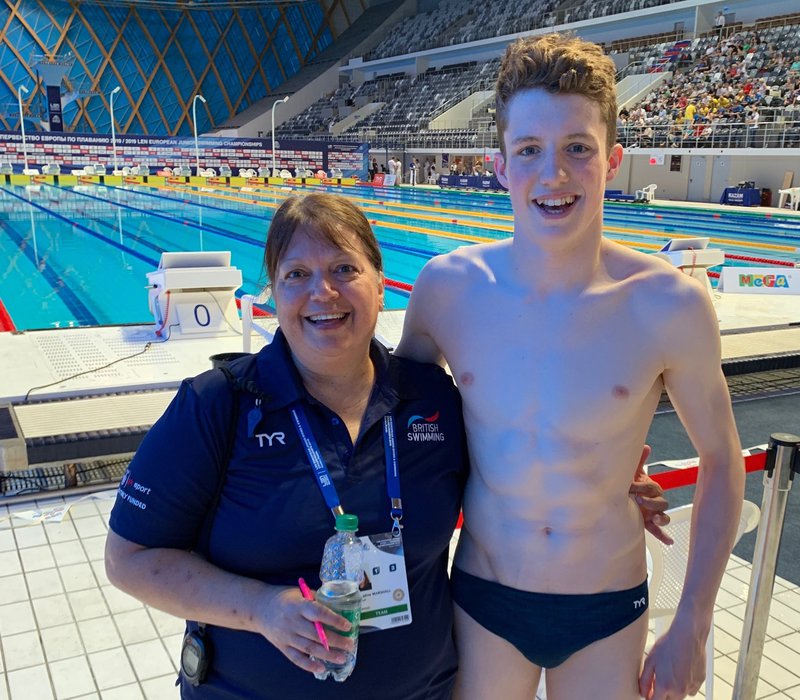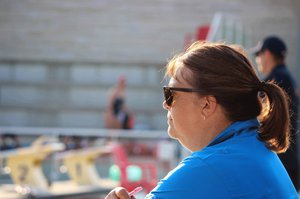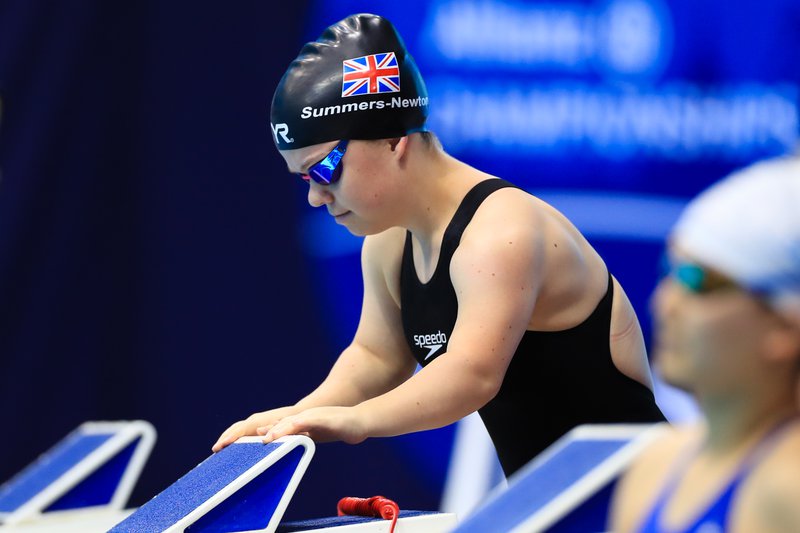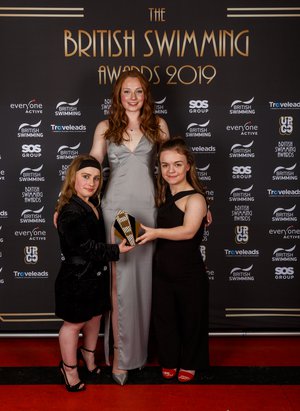When Jacquie Marshall first took charge of a stopwatch at one of her sons' swimming lessons in 1994, she did not realise the long, diverse and highly successful road it would lead her down in the world of aquatics sport.
In the intervening 27 years, Jacquie progressed through the coaching ranks to become Director of Swimming at Northampton Swimming Club in 2008, guiding athletes along the Paralympic and Olympic Pathways to a host of international medals at senior and junior level along the way.
Now three months into a new role as the Head of Performance Pathway with British Para-Swimming, Marshall talks through her personal coaching journey and what she thinks is most important when working with athletes in our latest Women In Water feature.
So, when she casts her mind back to her maiden taste of life on pooldeck, what does she remember of it?
"I was at training one day, just sat down while my son was having his session, and the coach - a lady called Kathy Timbs - said to me, 'do you think you could help me? I'll show you how to work a stopwatch...'" recalls Jacquie.
"I was like 'what?!' but I really enjoyed it, I liked the interaction with the kids and then suddenly Kathy was saying, 'we've booked you on a teachers' course, here it is, you've got to do this many weekends.' It just took off from there really.
"My children swam at Northampton and for many years I worked as an assistant coach to the squad they were in at the time. Then I was asked to take my own group, which became quite a juggling act, because I'd got one child swimming in one pool at 5pm on a Monday evening, another child swimming in another pool at 5.30pm and the group I was actively coaching were in a third pool at that same time!
"We wondered how on earth we'd juggle it, but we sorted that and so I took the lead of a group of junior age group athletes. At that time, there was a framework of competition called BAGCats (British Age Group Categories) where children had to race through different events to accumulate points, so they had to swim something like a medley event and a middle distance freestyle event, a 50m and a 200m and the athlete with the most points across all categories in their age won the trophy.

"I was determined that my group were going to qualify across all the BAGcat events for the county championships and, working with this group of young swimmers aged between nine and 12 was motivational, they won many of the trophies in their respective age groups and some went onto achieve regional qualifying times, which I hadn't set my stall out for. Then at regionals, I had three swimmers who qualified for Nationals, which frightened me to death!
"Throughout all that time, I had got quite a lot of support and influence from lots of different people and coaches who remain great friends and some who have sadly passed away. Some key people include Dave Heathcock, Chris Martin, Mark Perry, Mike Parker, Richard Blackshaw, Julie Bennett, Sue Purchase, Fred Furniss, Ian Turner, Tony Beckley, Fred Kirby, Mick Hepwood, Tim Jones and Dave Haller to name a few. Because my journey was a bit slower than others, perhaps, because of my family circumstances - I'd got two young children, I'd got a husband flying all over the world with his job and I was balancing the coaching with another job - I'd spent a lot of time working with other coaches as their assistant. So that meant I'd had quite a lot of exposure to their different methods, different ways of coaching the individual.
"On reflection, looking back now, that was really, really important for me. I found that gave me such a broad range of viewpoints and skills to pull on, it gave me lots of tools within my own toolbox that I could use, which was excellent.
"The further my coaching moved up the ladder, from counties to regionals to nationals and then to international juniors and then to senior para-swimming and able-bodied swimming, drawing on all that expertise was really key."
As a female coach on deck, Marshall found herself among the minority when starting out. Not that she allowed that to hold her back in any way. Instead, she went looking for opportunities that would help both herself and her athletes progress.
"When I first got on to deck, Dawn Peart was there, Sue Purchase, myself and probably a few more, but that was about it. When you turned up at a national-level competition, or even a regional competition, there wasn’t that many women on deck," she says.
"I wasn't treated any differently, though, and I think I was used to the fact that, as a woman in any field, you had to really prove your worth.
"There were certainly people that saw you as the 'mumsy' one, thinking 'look, she's on poolside because she is someone's mum’ rather than it being my profession. There were people who saw it like that - but I think you just have to be confident and you have to ask for opportunities.

"I remember being at a swimming conference years ago and Bill Sweetenham said, 'if anybody wants to come and work with me for a couple of days, I'll go through my coaching philosophy with you and we can discuss how you start to put yours together'. There were two of us who went up - myself and Kevin Renshaw, who was at Chester-le-Street at the time and has since gone on to coach at the Loughborough National Centre and oversee British Swimming's Performance Pathway as well.
"The opportunities were there, you had to go and get them, they weren't just going to be offered to you."
Jacquie - who knew Mel Marshall (no relation) as a swimmer and helped her during her formative steps into coaching - admits to being initially sceptical at the concept of a ‘Women into High Performance Coaching’ course she did some years ago with UK Coaching.
Ultimately, though, the innovative athlete influencer says she appreciated then and now why such a focus can be important and positive.
"When I first got the nomination for that course, I thought, 'why another 'Women Into...' thing, why is it women only?' But it was great, it was probably one of the best courses I did. It gave you confidence, we were working with women from different sports and talking about the fact that women think differently to men, men think differently to women - and working with other women there made you realise what you do know and it gave you confidence.
"All of a sudden, I realised that people were asking me things and I could answer. It really shouldn't be whether you are male or female, but rather recognising different skillsets.
"What I would say, certainly for myself and Andy Sharp (the new Director of Swimming at Northampton) the reason we've been successful is that we complement each other. And because we think of things slightly differently, when we come back together and bring our perspectives together, we probably come to a greater understanding overall.
"Male and female perspectives can bring different skills that can be equally as great. It's different skillsets that, very often, together, can be very powerful."
Among those Northampton "successes" are Paralympic champion Ellie Robinson and triple 2019 World Para-Swimming Championship medallist Maisie Summers-Newton, while previous alumni include Athens Olympian Caitlin McClatchley and butterfly specialist Aaron Wiles, who competed for England at the 1998 Commonwealth Games.
Robinson, Summers-Newton and teammate Mullooly - another 2019 Worlds medallist - all spoke glowingly of Marshall's influence on their lives when they collected the Para-Swimming Coach of the Year award on her behalf 15 months ago. And more recently, it was the words of European Junior medallist Ed Mildred that chimed with Jacquie's feelings on the work she does.

"For me, coaching is about coaching the whole person, and it always will be. We have to look at each person individually and what they can do," she explains.
"If they are stressing about exams and revision what is the point of them being at training that night? They are not going to be able to train properly. If they need an odd night because they need to do some revision I try not to stress too much about it.
"Perhaps one of the greatest things are the cards and the 'thank yous' you get in this job. It was so nice to hear what Ed said in his recent interview - I felt really proud because he was proud, if that makes sense. He was really proud of the club he has come from and appreciated the club and the journey he had been on and those who had influenced him.
"I have always wanted to do the best I could do for the athletes, regardless of whether they were going to the Olympics and Paralympics, or whatever else. I wanted to coach the whole person because if they are happy, if the whole person is happy, they will swim fast at their own level and achieve at their own level. That always was and always will be my philosophy.
"You have to coach the individual. Boys, girls, you cannot coach everybody the same because they are all so, so different."
Jacquie credits a series of people involved in swimming with helping her along the way over the past three decades, as she has done for many athletes and coaches herself.
Still, the woman who very first handed her that stopwatch holds a unique place in her heart. That is especially the case given Jacquie - who now plays such a key role in helping Britain stay among the most successful para-swimming nations in the world - had next to no background in swimming when she first started out.

"If I look back now, I realise how many different people played an influence on my career, and without them actually knowing," reflects Marshall.
"I'll be eternally grateful to Kathy Timbs, because she was a junior coach at Northampton who got me into coaching. She was the one that inspired me, really, and technically, she was excellent. Not being a swimmer myself, that technical expertise was good to have available and learn from.
"I can remember thinking that because I'd never been a swimmer, there was no way I could be a great coach, because how did I understand what had happened or what was happening around a specific stroke, things like that?
"Actually, one of the things I did learn - and I say this to a lot of people now - is that I actually became a scholar of the sport. I read around it a lot, I read around different stroke techniques, I watched a lot of things on YouTube, just to look at different ways of doing things and looking at the athlete individually.
"Rather than seeing the fact I hadn't been a swimmer as a negative, in some ways I tried to look at it is a positive. I came to appreciate that, and it certainly moved me on because it made me much more enquiring - I had to solve the problem rather than thinking I'd solved it by remembering what I'd been taught myself.
"Now I have this role as the Head of Performance Pathway, which I'm really excited by. Yes, in some ways it's quite overwhelming - it's a lot of responsibility, it's looking at things slightly differently. But I think I bring a different perspective, and that is what people have said. Hopefully it'll be a valuable one.
"When I think back to 1994, when I took my first teaching qualification, and then I flick forward to now, it has been quite a journey so far, it has been amazing.
"To work with athletes is just great. I think the difference you can make to people is phenomenal. That's what I enjoy, really."

